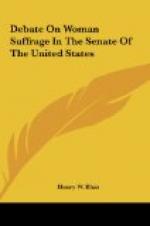are the only forces which enter into the exercise
of this highest and primary function of government.
The remaining department is the executive or administrative,
and in all forms of government—the republican
as well as in tyranny—the primary element
of administration is force, and even in this department
conscience and intelligence are indispensable
to its direction.
If now we are to decide who of our sixty millions of human beings are to constitute the citizenship of this Republic and by virtue of their qualifications to be the law-making power, by what tests shall the selection be determined?
The suffrage which is the sovereignty is this great primary law-making power. It is not the executive power proper at all. It is not founded upon force. Only that degree of physical strength which is essential to a sound body—the home of the healthy mental and moral constitution—the sound soul in the sound body is required in the performance of the function of primary legislation. Never in the history of this or any other genuine republic has the law-making power, whether in general elections or in the framing of laws in legislative assemblies, been vested in individuals who have exercised it by reason of their physical powers. On the contrary, the physically weak have never for that reason been deprived of the suffrage nor of the privilege of service in the public councils so long as they possessed the necessary powers of locomotion and expression, of conscience and intelligence, which are common to all. The aged and the physically weak have, as a rule, by reason of superior wisdom and moral sense, far more than made good any bodily inferiority by which they have differed from the more robust members of the community in the discussion and decisions of the ballot-box and in councils of the state.
The executive power of itself is a mere physical instrumentality—an animal quality—and it is confided from necessity to those individuals who possess that quality, but always with danger, except so far as wisdom and virtue control its exercise. And it is obvious that the greater the mass of higher and spiritual forces, whether found in those to whom the execution of the law is assigned or in the great mass by whom the suffrage is exercised, and who direct the execution of the law, the greater will be the safety and the surer will be the happiness of the state.
It is too late to question the intellectual and moral capacity of woman to understand great political issues (which are always primarily questions of conscience—questions of the intelligent application of the principles of right and of wrong in public and private affairs) and properly decide them at the polls. Indeed, so far as your committee are aware, the pretense is no longer advanced that woman should not vote by reason of her mental or moral unfitness to perform this legislative function; but the suffrage is denied to her because




